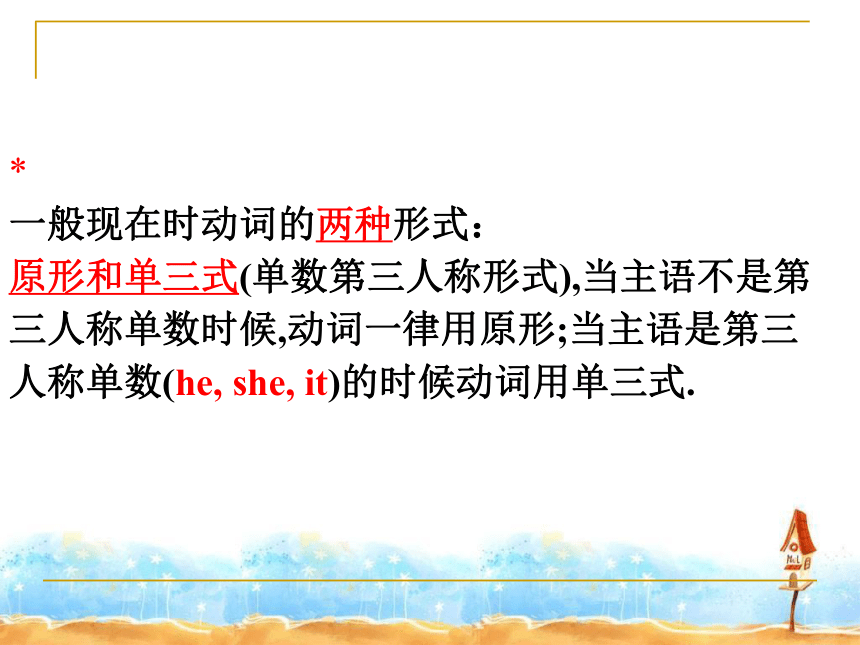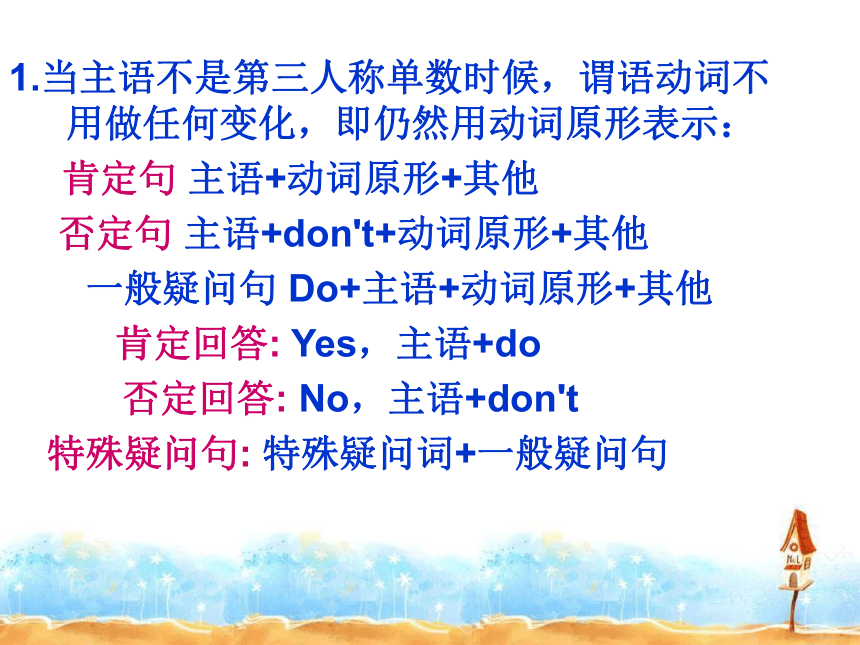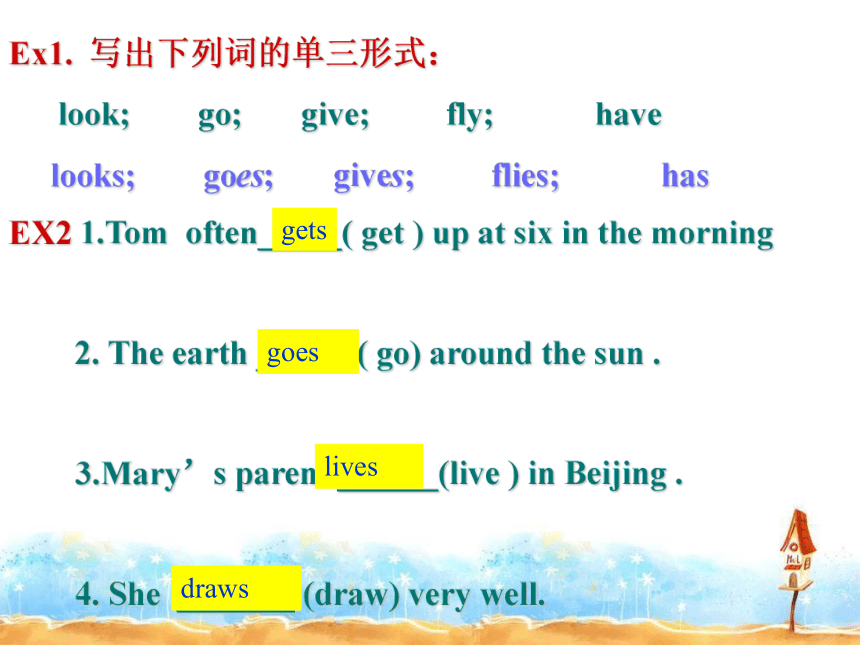Unit 3 Friends from other countries 一般现在时 课件
文档属性
| 名称 | Unit 3 Friends from other countries 一般现在时 课件 |

|
|
| 格式 | zip | ||
| 文件大小 | 270.1KB | ||
| 资源类型 | 教案 | ||
| 版本资源 | 牛津上海版(试用本) | ||
| 科目 | 英语 | ||
| 更新时间 | 2016-11-18 00:00:00 | ||
图片预览









文档简介
课件27张PPT。一般现在时
定义:
一般现在时。表示通常性、规律性、习惯性的状态或者动作(有时间规律发生的事件)的一种时间状态 1.表示现在的状态:
e.g. He’s twelve.
She’s at work.
2.表经常或习惯性的动作:常与表示频率的时间状语连用
时间状语: always, usually, often,sometimes,
twice a week,seldom,once a month, on Sundays
every morning/night/evening/day/week/year
e.g. I get up at 6:30 every day.
He reads English every morning.
3.表主语具备的性格和能力等:
e.g. She likes noodles.
They speak French.
4.普遍真理和自然规律:
e.g. Two plus four is six.
The moon goes around the earth.
表示格言或警句中。
e.g Pride goes before a fall. 骄者必败。
☆注意★:此用法如果出现在宾语从句中,即使主句是过去时,从句谓语也要用一般现在时。
例:Columbus proved that the earth is round..
*
一般现在时动词的两种形式:
原形和单三式(单数第三人称形式),当主语不是第三人称单数时候,动词一律用原形;当主语是第三人称单数(he, she, it)的时候动词用单三式.
1.当主语不是第三人称单数时候,谓语动词不用做任何变化,即仍然用动词原形表示:
肯定句 主语+动词原形+其他
否定句 主语+don't+动词原形+其他
一般疑问句 Do+主语+动词原形+其他
肯定回答: Yes,主语+do
否定回答: No,主语+don't
特殊疑问句: 特殊疑问词+一般疑问句 2.主语是任何一个单数名词或者是第三人称单数,谓语动词要进行必要的变化。特别提一点:不可数名词也算作单数处理。
肯定句: 主语+动词的第三人称单数+其他
否定句: 主语+doesn't+动词原形+其他
一般疑问句 : Does+主语+动词原形+其他
肯定回答: Yes,主语+does
否定回答: No,主语+doesn't
特殊疑问句: 特殊疑问词+一般疑问句 1、一般动词,在词尾加 s ; 如:
work--works, live--lives, play--plays, sing-- sings.
eg: She lives in Ningbo. 她住在宁波。
2、以/s/ /z/ 等音素结尾的动词,词尾加 -es ,如词尾为 e, 只加-s. 读作 /iz /如:
teach------ teaches, wash----- washes.
eg: My mother washes the coat.
我母亲洗了大衣。
一般现在时第三人称单(he,she,it) 的构成规则:动词变化规律3.以辅音字母加Y 结尾的词,把Y变I 再加ES,读作[Z]Study flystudiesflied 4.以辅音字母+O结尾的词,一般情况是在词尾加es 读作[Z]
go do goesdoes5.特殊情况:have has EX2 1.Tom often_____( get ) up at six in the morning
2. The earth ______( go) around the sun .
3.Mary’s parent ______(live ) in Beijing .
4. She _______ (draw) very well. Ex1. 写出下列词的单三形式:
look; go; give; fly; have
looks; goes; gives; flies; has
getsgoeslivesdrawsII 一般现在时的否定式
1.Be 动词的否定式: be + not
I am a teacher.
You are a worker
She is a doctor
We are friends.I’m not a teacher
You aren’t a worker
She isn’t a doctor.
We aren’t friends.
is not=isn’t
are not=aren’t 否定句否定句型1.谓语动词或助动词是 be、have或者情态动词can/may/must 等,在助动词后加not.
I am not at college.
Mr. Wang isn't 50 years old.
The Jacksons haven't two sons.
You may not go now. 2.谓语动词是实义动词,是在谓语动词前加do not 或does not,谓语动词改用动词原型。
I don't have lunch at home.
They don't play basketball on the sportsground.
Mr.Jimmy doesn't know French. Ex1. 将下列各句从肯定式改为否定式I talk to Peter because I like him..
Kate comes from America. Kate works with Peter
I am Chinese, and I am a student.
They know each other.
I don’t talk to Peter because I don’t like him.Kate doesn’t come from America.Kate doesn’t work with Peter.I am not Chinese, and I am not a studentThey don’t know each other.概念:用 yes 或 no 来回答的疑问句叫做一般疑问句。III一般疑问句I am a teacher.
You are a worker.
He is a student.
We are friends. 1.对于BE 动词,疑问句要求把BE 提前,第一人称的单数和复数(I/WE),第一变成第二人称。疑问句Are you a teacher?
Are you a worker?
Is he a student?
Are you friends?2.对于实意动词,疑问句要求是:当主语是他(he),她(she),它(it)时,句子前面加DOES,并把动词恢复原形;当主语是其他人称时,句前加DO ,第一人(I/we) 称换第二人称(you)。I often go there.
You like the music.
He goes to work by bus .
We /You/They like it.Do you often go there ?
Do you like the music.?
Does he go to work by bus ?
Do you/they like it?Ex1.请做练习1.Her parents live in Shanghai .
否: Her parents______________ in Shanghai.
疑: _______ her parents_______ in Shanghai?.
2.You study English .
否: You study English .
疑: you study English ?
3. How often Tom football?
A.is ,play B. do,play C. does, play D.does,plays don’t liveDo liveDon’tDo C请把下列句子变成否定句和疑问句。The sun rises in the east.
2.Tom gets up at six in the morning.
The sun doesn’t rise in the east.
Does the sun rise in the east?Tom doesn’t get up at six in the morning.
Does Tom get up at six in the morning?3. They live in Shanhai.
4. I am a student.They don’t live in Shanhai.
Do they live in Shanhai?I am not a student.
Are you a student?Ⅳ. 特殊疑问句特殊疑问句在考试中涉及的比较多,主要以选择和转换句型为主,首先要掌握一些常用疑问词的意思如:what(什么),when, what time(什么时间), who(谁), where(在哪里), why(为什么), how(怎样), how many+可数名词的复数(多少), how long(多长时间), how often(多久一次) 等,其次掌握它的语序,即就是特殊疑问词+一般疑问句语序(Who)除外
一、疑问词+ 一般疑问句句序:
Where are you from?
I’m from the north.
What do you want?
I want the books on your desk.
特殊疑问句的语序 Ex2. 将下列句子变成其否定句,并就斜体部分提问。
1.???She comes from America.
2.???I usually go to school by bike.
Does she come from America?
She doesn’t come from Ameica.
Where does she come from?I don’t usually go to school by bike.
Do you usually go to school by bike?
How do you usually go to school ?V 选择疑问句选择疑问句: (直接回答,与YES 和NO 无关)
1.Does she work in a factory or in an office?
2.Which do you like best, football, basketball or volleyball?
Eg: Does she play football or basketball?
A.Yes, she does B. she plays football.
C. No, she doesn’t
反意疑问句,遵循的原则是 :前肯,后否;前否,后肯。其中,前否包括是带有not的否定,还包括前面句中含有否定意义的词,如seldom(很少), hardly(几乎不), never(从来也不), little, few(很少,不多) etc.
Ⅵ.反意疑问句例如;
1. She lives in Ningbo,____________ ?
疑问句:Does she live in Ningbo?2. They are students,__________ ?
Are they students?
3.It seldom snows in kunming,___________?
Does it snow in kunming?aren’t theydoes itdoesn’t she用所给动词的正确形式填空:
1.We often ______(play) in the playground.
2.She often ______(watch) TV with her dog.
3.The earth ______(go) around the sun.
4.My mother _______look) after my little sister at home.
5. Lucy ________(have) some friends here.
6.Fang Ming _____________(not like )rice at all.
7.We_____(go)to school at 7:30 in the morning .
8.Mary seldom ________ (come) here.
9.Her uncle often _______ (drive) to Beijing.
10.Tom ______ (want) _________ ( work) in Hainan. playwatcheslooksdoesn’t likehasgocomeswantsdrivesto workgoesWe often______(play) in the playgound.
2. He _____(get) up at six o’clock.
3. _____you ______(brush) your teeth every morning.
4. What (do) ______he usually (do)______ after school?
5. Danny _______ (study) English,Chinese,Maths,Science and Art an school. plays gets brush Dodo doesstudies 6. Mike sometimes ________(go) to the park with his sister.
7. At eight at night, she __________(watch) TV with his parents.
8. ________ Mike________(read) English every day?
9. How many lessons_________your classmate________(have) on Monday?
10. What time_________his mother_________(do) the housework? goes watches read Doesdoeshave do does
定义:
一般现在时。表示通常性、规律性、习惯性的状态或者动作(有时间规律发生的事件)的一种时间状态 1.表示现在的状态:
e.g. He’s twelve.
She’s at work.
2.表经常或习惯性的动作:常与表示频率的时间状语连用
时间状语: always, usually, often,sometimes,
twice a week,seldom,once a month, on Sundays
every morning/night/evening/day/week/year
e.g. I get up at 6:30 every day.
He reads English every morning.
3.表主语具备的性格和能力等:
e.g. She likes noodles.
They speak French.
4.普遍真理和自然规律:
e.g. Two plus four is six.
The moon goes around the earth.
表示格言或警句中。
e.g Pride goes before a fall. 骄者必败。
☆注意★:此用法如果出现在宾语从句中,即使主句是过去时,从句谓语也要用一般现在时。
例:Columbus proved that the earth is round..
*
一般现在时动词的两种形式:
原形和单三式(单数第三人称形式),当主语不是第三人称单数时候,动词一律用原形;当主语是第三人称单数(he, she, it)的时候动词用单三式.
1.当主语不是第三人称单数时候,谓语动词不用做任何变化,即仍然用动词原形表示:
肯定句 主语+动词原形+其他
否定句 主语+don't+动词原形+其他
一般疑问句 Do+主语+动词原形+其他
肯定回答: Yes,主语+do
否定回答: No,主语+don't
特殊疑问句: 特殊疑问词+一般疑问句 2.主语是任何一个单数名词或者是第三人称单数,谓语动词要进行必要的变化。特别提一点:不可数名词也算作单数处理。
肯定句: 主语+动词的第三人称单数+其他
否定句: 主语+doesn't+动词原形+其他
一般疑问句 : Does+主语+动词原形+其他
肯定回答: Yes,主语+does
否定回答: No,主语+doesn't
特殊疑问句: 特殊疑问词+一般疑问句 1、一般动词,在词尾加 s ; 如:
work--works, live--lives, play--plays, sing-- sings.
eg: She lives in Ningbo. 她住在宁波。
2、以/s/ /z/ 等音素结尾的动词,词尾加 -es ,如词尾为 e, 只加-s. 读作 /iz /如:
teach------ teaches, wash----- washes.
eg: My mother washes the coat.
我母亲洗了大衣。
一般现在时第三人称单(he,she,it) 的构成规则:动词变化规律3.以辅音字母加Y 结尾的词,把Y变I 再加ES,读作[Z]Study flystudiesflied 4.以辅音字母+O结尾的词,一般情况是在词尾加es 读作[Z]
go do goesdoes5.特殊情况:have has EX2 1.Tom often_____( get ) up at six in the morning
2. The earth ______( go) around the sun .
3.Mary’s parent ______(live ) in Beijing .
4. She _______ (draw) very well. Ex1. 写出下列词的单三形式:
look; go; give; fly; have
looks; goes; gives; flies; has
getsgoeslivesdrawsII 一般现在时的否定式
1.Be 动词的否定式: be + not
I am a teacher.
You are a worker
She is a doctor
We are friends.I’m not a teacher
You aren’t a worker
She isn’t a doctor.
We aren’t friends.
is not=isn’t
are not=aren’t 否定句否定句型1.谓语动词或助动词是 be、have或者情态动词can/may/must 等,在助动词后加not.
I am not at college.
Mr. Wang isn't 50 years old.
The Jacksons haven't two sons.
You may not go now. 2.谓语动词是实义动词,是在谓语动词前加do not 或does not,谓语动词改用动词原型。
I don't have lunch at home.
They don't play basketball on the sportsground.
Mr.Jimmy doesn't know French. Ex1. 将下列各句从肯定式改为否定式I talk to Peter because I like him..
Kate comes from America. Kate works with Peter
I am Chinese, and I am a student.
They know each other.
I don’t talk to Peter because I don’t like him.Kate doesn’t come from America.Kate doesn’t work with Peter.I am not Chinese, and I am not a studentThey don’t know each other.概念:用 yes 或 no 来回答的疑问句叫做一般疑问句。III一般疑问句I am a teacher.
You are a worker.
He is a student.
We are friends. 1.对于BE 动词,疑问句要求把BE 提前,第一人称的单数和复数(I/WE),第一变成第二人称。疑问句Are you a teacher?
Are you a worker?
Is he a student?
Are you friends?2.对于实意动词,疑问句要求是:当主语是他(he),她(she),它(it)时,句子前面加DOES,并把动词恢复原形;当主语是其他人称时,句前加DO ,第一人(I/we) 称换第二人称(you)。I often go there.
You like the music.
He goes to work by bus .
We /You/They like it.Do you often go there ?
Do you like the music.?
Does he go to work by bus ?
Do you/they like it?Ex1.请做练习1.Her parents live in Shanghai .
否: Her parents______________ in Shanghai.
疑: _______ her parents_______ in Shanghai?.
2.You study English .
否: You study English .
疑: you study English ?
3. How often Tom football?
A.is ,play B. do,play C. does, play D.does,plays don’t liveDo liveDon’tDo C请把下列句子变成否定句和疑问句。The sun rises in the east.
2.Tom gets up at six in the morning.
The sun doesn’t rise in the east.
Does the sun rise in the east?Tom doesn’t get up at six in the morning.
Does Tom get up at six in the morning?3. They live in Shanhai.
4. I am a student.They don’t live in Shanhai.
Do they live in Shanhai?I am not a student.
Are you a student?Ⅳ. 特殊疑问句特殊疑问句在考试中涉及的比较多,主要以选择和转换句型为主,首先要掌握一些常用疑问词的意思如:what(什么),when, what time(什么时间), who(谁), where(在哪里), why(为什么), how(怎样), how many+可数名词的复数(多少), how long(多长时间), how often(多久一次) 等,其次掌握它的语序,即就是特殊疑问词+一般疑问句语序(Who)除外
一、疑问词+ 一般疑问句句序:
Where are you from?
I’m from the north.
What do you want?
I want the books on your desk.
特殊疑问句的语序 Ex2. 将下列句子变成其否定句,并就斜体部分提问。
1.???She comes from America.
2.???I usually go to school by bike.
Does she come from America?
She doesn’t come from Ameica.
Where does she come from?I don’t usually go to school by bike.
Do you usually go to school by bike?
How do you usually go to school ?V 选择疑问句选择疑问句: (直接回答,与YES 和NO 无关)
1.Does she work in a factory or in an office?
2.Which do you like best, football, basketball or volleyball?
Eg: Does she play football or basketball?
A.Yes, she does B. she plays football.
C. No, she doesn’t
反意疑问句,遵循的原则是 :前肯,后否;前否,后肯。其中,前否包括是带有not的否定,还包括前面句中含有否定意义的词,如seldom(很少), hardly(几乎不), never(从来也不), little, few(很少,不多) etc.
Ⅵ.反意疑问句例如;
1. She lives in Ningbo,____________ ?
疑问句:Does she live in Ningbo?2. They are students,__________ ?
Are they students?
3.It seldom snows in kunming,___________?
Does it snow in kunming?aren’t theydoes itdoesn’t she用所给动词的正确形式填空:
1.We often ______(play) in the playground.
2.She often ______(watch) TV with her dog.
3.The earth ______(go) around the sun.
4.My mother _______look) after my little sister at home.
5. Lucy ________(have) some friends here.
6.Fang Ming _____________(not like )rice at all.
7.We_____(go)to school at 7:30 in the morning .
8.Mary seldom ________ (come) here.
9.Her uncle often _______ (drive) to Beijing.
10.Tom ______ (want) _________ ( work) in Hainan. playwatcheslooksdoesn’t likehasgocomeswantsdrivesto workgoesWe often______(play) in the playgound.
2. He _____(get) up at six o’clock.
3. _____you ______(brush) your teeth every morning.
4. What (do) ______he usually (do)______ after school?
5. Danny _______ (study) English,Chinese,Maths,Science and Art an school. plays gets brush Dodo doesstudies 6. Mike sometimes ________(go) to the park with his sister.
7. At eight at night, she __________(watch) TV with his parents.
8. ________ Mike________(read) English every day?
9. How many lessons_________your classmate________(have) on Monday?
10. What time_________his mother_________(do) the housework? goes watches read Doesdoeshave do does
同课章节目录
- Module 1 Relationships
- Unit 1 Relationships in beijing
- Unit 2 Our animal friends
- Unit 3 Friends from other countries
- Module 2 My Neighborhood
- Unit 4 Jobs people do
- Unit 5 Choosing a new flat
- Unit 6 Different places
- Unit 7 Signs around us
- Module 3 Diet and health
- Unit 8 Growing healthy,growing
- Unit 9 International Food Festival
- Unit 10 A birthday party
- Unit 11 My food project
